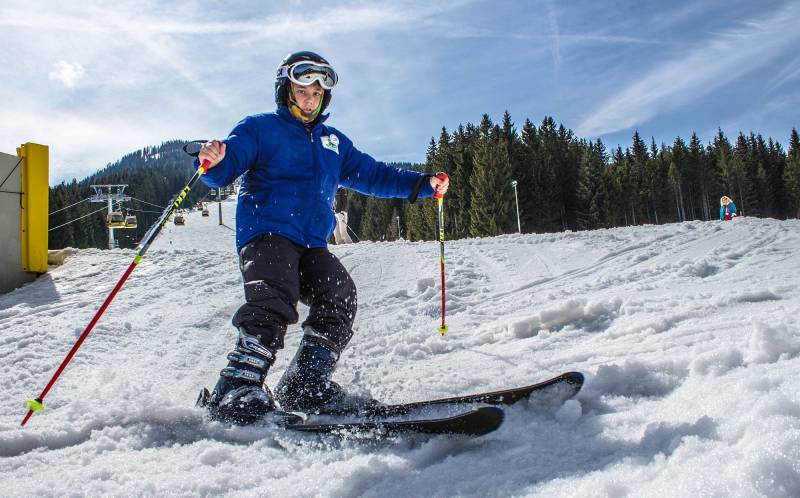The little hero who conquered the Super Giant Slalom

Amir Gusev finshed the Super Giant Slalom in 1 minute 2,39 seconds. He improved his divisioning result by 13 seconds. (Photo: Bavo Delbaere)
Bavo Delbaere, AIPS Young Reporter, Belgium
SCHLADMING/RAMSAU, March 22, 2017 – Two skis make a horizontal turn, snow shoots inall directions. Time is stopped, and the cheering crowds reach a crescendo.They just witnessed a special performance. A member of the USA skiingdelegation quickly grabs a pen and jokingly writes down ‘Amir Gusev’ on their nationalcontestant list. He just saw the Uzbek 11-year old snatch away the gold medal inthe Advanced Super Giant Slalom Final.
Amir has quickly raced his way to fame in the Special Olympic corridors.A group of volunteers pat him on the shoulder and seize the opportunity to talkto him as he passes by. “We’ve heard you’re quite a talent. When will you beracing again? We want to make sure we’re there to watch!” They seem just ascaptivated as Bryan Tweit, an Alpine Skiing Coach from team USA who was on siteduring the race. “Suddenly a very young athlete shows up on top of themountain. He starts zigzagging down better and faster than all the olderopponents. It was not just some ordinary race, it was the final of the SuperGiant Slalom advanced division. That’s quite an achievement at such a youngage, my jaws literally dropped.”
Uzbekistan team coach Dmitriy Pitirimov stays cool under all the excitement. “It’s not about pride, I don’t like that feeling. I am grateful though. Pridegives you the feeling you are already there, gratefulness keep your feet on theground. I won’t deny that he did a great job of course! I checked the clocktwice just to be sure it really happened. It was incredible! But the next racecan be something wholely different, it does not end here, I want him to continue training hard.”
The talented youth grew up in Tashkent, the capital of Uzbekistan: acountry that has everlasting snow, mountain peaks that reach 4500 metres andplenty of untouched nature. He has trouble with reading, writing and expressinghimself. His father died when he was still very young so with only his motherlooking out for him, it has not been an easy time for the small family. Amirspends most of his time in a school for disabled children.
In 2009, coach Dmitriy started cooperating with the school. The idea wasto take the disabled kids to go rock climbing. From there on his life took aradical twist. He got involved with the children a lot, one of which he adoptedas his own daughter. Two other young rock climbers turned into very successfulsportsmen. “They are now competing in the national team of Uzbekistan. I’m nottalking about the Special Olympics, but the regular national team!” Dmitriy pointsout.
The Uzbek coach started preparing for the Winter Games in Austria duringthe fall of 2016. He has 30 years of experience in Alpine skiing and time wasripe to pass on his knowledge. A new group of youngsters from the school wereselected, they started training from scratch. The first days they were justwalking and trying to find the balance on the skis. Step by step progress wasmade and slowly but surely their talent rose to the surface.
Coach Dmitriy soon realized one of them was very gifted: Amir. “He is 11years old so he doesn’t weigh as much as his opponents who are adults, hisfeatherweight is a disadvantage in skiing but Amir overthrows that with hisbravery.” The pupil knows what it takes to perform, he uses his excellentbalance as an asset. He might have learning difficulties but when it comes topractical things he adapts very fast.
According to Dmitriy, a coach must do more than just train his athletes.“You have to be a mentor, take responsibility and guide them through life.” Heis not the kind of person who will dictate life lessons to his disciples.According to him it’s all about setting good examples. Because when you letthem experience positive moments, they will eventually come out of their shell.
“Hospitality is anchored in the Uzbek way of life. In the summer orduring vacation I invite the athletes to my home. My family gives them food,care and love. We spend time togetherhigh in the mountains and we ski till the sun goes down. He won a gold medal but I will trulyhave succeeded when he has a good job later and can participate in society likeeverybody else.”